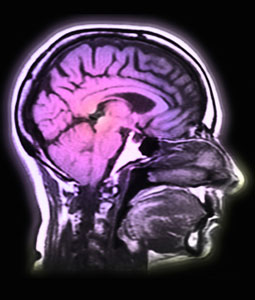Brain
What is a brain?

The human brain is the center of the central nervous system in humans as well as the primary control center for the peripheral nervous system.
The brain gives us intelligence and the ability to reason. It is also the source of cognition, emotion, memory, motor, and other forms of learning, and it controls and coordinates most sensory systems, movements and behaviors. It also controls body functions such as the heart rate, blood pressure, fluid balance, and body temperature. Some behaviors such as simple reflexes and basic movement can be executed under spinal cord control alone.
How does it work?

The brain conist of billions of cells called neurons that can produce little bursts of electricity, passing from one cell to another. These bursts produce weak electric fields at the surface of the head that can be recorded.
For example electric fields that are larger and slowly-varying indicate sleep, whereas smaller and faster-varying fields indicate alertness. Electrical activity increases in certain regions of the brain when people remember, speak, or blow their nose.
The brain controls the 'lower' or involuntary activities such as heartbeat, respiration, and digestion - these are known as autonomic functions. The brain also controls "higher" order, conscious activities, such as thought, reasoning, and abstraction. The human brain is generally regarded as more capable of these higher order activities than any other species.
Mind and brain
The brain is defined as the physical, biological matter contained within the skull, responsible for all electrochemical neuronal processes. The mind, however, is seen in terms of mental attributes, such as beliefs or desires.
Some suggest that the mind exists independently from the brain, such as in a soul or epiphenomenon. Others, such as strong AI (Artificial Intelligence) theorists, say that the mind is directly parallel to a computer software and the brain to a hardware.